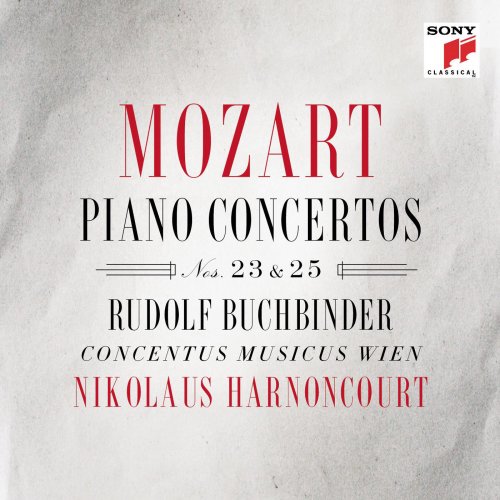
Rudolf Buchbinder, Nikolaus Harnoncourt - Mozart: Piano Concertos Nos. 23 & 25 (2012)
BAND/ARTIST: Rudolf Buchbinder, Nikolaus Harnoncourt
- Title: Mozart: Piano Concertos Nos. 23 & 25
- Year Of Release: 2012
- Label: Sony Classical
- Genre: Classical
- Quality: FLAC (tracks)
- Total Time: 55:53
- Total Size: 232 Mb
- WebSite: Album Preview
Tracklist:
Piano Concerto No. 25 in C major, K. 503 (Wolfgang Amadeus Mozart)
1. I. Allegro maestoso 15:04
2. II. Andante 06:48
3. III. Allegretto 08:32
Piano Concerto No. 23 in A major, K. 488 (Wolfgang Amadeus Mozart)
4. I. Allegro 11:00
5. II. Adagio 06:14
6. III. Allegro assai 08:15
Performers:
Rudolf Buchbinder, piano
Concentus Musicus Wien
Nikolaus Harnoncourt, conductor
Piano Concerto No. 25 in C major, K. 503 (Wolfgang Amadeus Mozart)
1. I. Allegro maestoso 15:04
2. II. Andante 06:48
3. III. Allegretto 08:32
Piano Concerto No. 23 in A major, K. 488 (Wolfgang Amadeus Mozart)
4. I. Allegro 11:00
5. II. Adagio 06:14
6. III. Allegro assai 08:15
Performers:
Rudolf Buchbinder, piano
Concentus Musicus Wien
Nikolaus Harnoncourt, conductor
This recording features a pair of Austrian musicians: conductor Nikolaus Harnoncourt, who is known for historical performances, and pianist Rudolf Buchbinder, who isn't. Buchbinder uses the state-of-the-art Mozart fortepiano, a copy of an Anton Walter instrument by American-Czech builder Paul McNulty, and he gets a big, broad sound out of it. Especially in the Piano Concerto No. 25 in C major, K. 503, he's just about able to stand up to Harnoncourt's 37-member Concentus Musicus Wien with its panoply of natural horns and period strings and winds. Harnoncourt's direction here is not quite as iconoclastic as in some of his readings; what you get is a pretty straightforward historical-instrument sound with spicy strings and winds that cut through the texture. In the C major concerto, a grand work, the instrumental effects are spread out, and Buchbinder matches the orchestral dimensions with an impressive cadenza of his own in the first movement. In the Piano Concerto No. 23 in A major, K. 488, the balance is a bit less successful. There are again many nice moments from Buchbinder's fortepiano, but when the orchestra's massed strings enter forte, it can be a bit of a jolt. Part of the issue may be the venue: the music was recorded over five days, apparently live, at the 1870s-vintage Musikverein in Vienna, not really the right place for this music, and the placement of the instruments might have sounded better to the crowd than it does here. There's a lot to like in this recording, not least the fact that Buchbinder makes an unusually effective transition to a period instrument. But the recording is not entirely successful sonically.
DOWNLOAD FROM ISRA.CLOUD
Rudolf Buchbinder Nikolaus Harnoncourt Mozart Piano Concertos 23 & 25 12 3110.rar - 232.9 MB
Rudolf Buchbinder Nikolaus Harnoncourt Mozart Piano Concertos 23 & 25 12 3110.rar - 232.9 MB
As a ISRA.CLOUD's PREMIUM member you will have the following benefits:
- Unlimited high speed downloads
- Download directly without waiting time
- Unlimited parallel downloads
- Support for download accelerators
- No advertising
- Resume broken downloads


